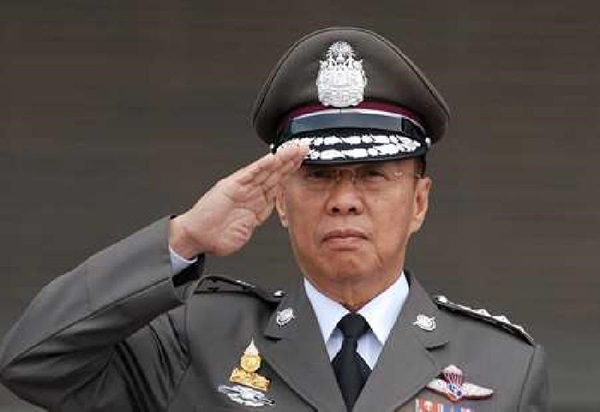Patcharawat Wongsuwan: The link for Prawit and Thaksin to forge a new govt?

Former national police chief Patcharawat Wongsuwan has been dragged from obscurity into the media spotlight with his recent appointment as chief adviser to the outgoing ruling party, Palang Pracharath.
The appointment was made by his elder brother, General Prawit Wongsuwan, shortly after Prawit’s re-election as party leader late last month.
Appointing Patcharawat to the post, which was previously held by Prawit, is widely seen as a move to pave the way for Palang Pracharath to enter a Pheu Thai-led coalition government in the making.
Negotiations are reportedly underway for the alliance.
According to media reports, Patcharawat will take a key ministerial post and also a deputy premier’s seat, while Prawit will not be in the Cabinet. Unnamed sources say this arrangement is meant to distance the Pheu Thai-led government from a figure linked to General Prayut Chan-o-cha’s post-coup junta. However, the speculation was dismissed as untrue by Palang Pracharath deputy leader Chaiwut Thanakamanusorn.
Sources close to Patcharawat have reportedly said he has no intention of getting embroiled in politics and that his appointment as party chief adviser came as a surprise to him. But Patcharawat has made no public comments on the matter.
Close ties with Thaksin
Pol General Patcharawat, 74, has close ties with former prime minister Thaksin Shinawatra, who is regarded as the patriarch of the Pheu Thai Party. They were schoolmates at the Royal Police Cadet Academy – Patcharawat was in Class 25 and Thaksin in Class 26.
Thaksin has lived in self-exile overseas since 2008 after receiving prison sentences in absentia for power abuse and other offenses. His planned return to Thailand this month was postponed amid uncertainties over formation of a government.
Political observers are convinced that Patcharawat has acted as a secret backchannel for communication between Thaksin and Prawit for many years. His big brother has denied having any direct contact with the former premier.
Serving under 3 prime ministers
Born in Bangkok on March 22, 1949, Patcharawat graduated from the Armed Forces Academy Preparatory School before obtaining a bachelor’s degree from the Royal Police Cadet Academy. He then took a master’s degree in social development at Kasetsart University.
Patcharawat served intermittently as the Royal Thai Police commissioner-general under three prime ministers – Samak Sundaravej, Somchai Wongsawat, and Abhisit Vejjajiva – between February 2008 and September 2009, during one of the most tumultuous periods in Thai politics. As police chief, Patcharawat was appointed to teams responsible for dealing with anti-government protesters.
In February 2008, Samak appointed Patcharawat as national police chief to replace Sereepisuth Temeeyaves, who had been suspended from duty over alleged disciplinary violations. Sereepisuth claimed at the time he had been “robbed” of his position.
Under Samak’s successor, Somchai, Patcharawat was put in charge of dealing with anti-government protesters gathering outside Parliament in October 2008. The rallies were organized by the yellow-shirt People’s Alliance for Democracy (PAD).
After a police crackdown on protesters led to several deaths and many injuries, the prime minister in November that year moved Patcharawat to an inactive post at the PM’s Office.
However, in December that year, caretaker prime minister Chavarat Charnvirakul of the short-lived Somchai government reinstated Patcharawat as national police chief – the first time this had ever occurred.
Removed but reinstated later
Under the government led by Somchai’s successor, Abhisit Vejjajiva, the National Anti-Corruption Commission (NACC) in September 2009 found Patcharawat guilty of malfeasance for failing to prevent the violent police crackdown on yellow-shirt protesters.
Then-PM Abhisit signed an order in October 2009 to dismiss Patcharawat as the national police chief.
Patcharawat appealed to the Police Commission, which ruled that he had not committed the severe disciplinary wrongdoing alleged by the NACC. The commission proposed that he should be reinstated.
Patcharawat took his case to the Administrative Court, asking to be reinstated as per the Police Commission’s recommendation so that his retirement benefits could be restored. In February 2014, the court found that PM Abhisit had failed to take appropriate action on the Police Commission’s resolution. The court ruled that Patcharawat be reinstated within 60 days.
After assuming premiership later that year, General Prayut ordered the revocation of Patcharawat’s dismissal and sought royal endorsement for his retirement from office at normal retirement age rather than sacking. The PM received the royal endorsement in November that year.
By Thai PBS World’s Political Desk






